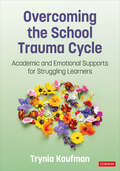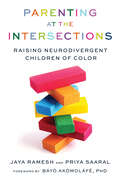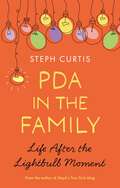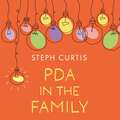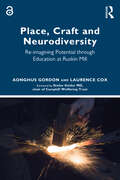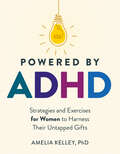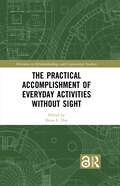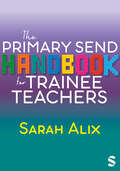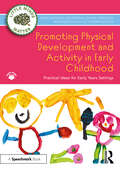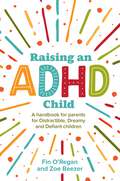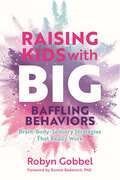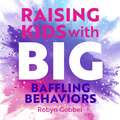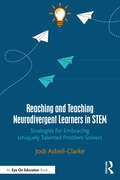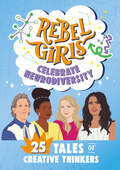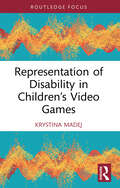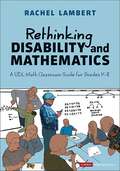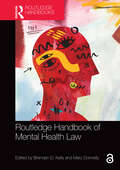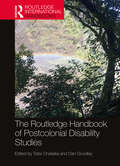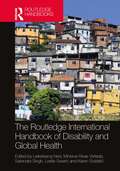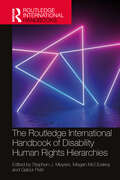- Table View
- List View
Overcoming the School Trauma Cycle: Academic and Emotional Supports for Struggling Learners
by Trynia KaufmanDisrupt the painful cycle of academic challenges and emotional distress When students struggle with learning, it can be stressful for both them and their teachers. Struggling learners are more likely to experience low self-esteem, anxiety, depression, and behavioral issues—challenges that, combined with highly stressful learning experiences, can tip students into a trauma response that makes learning even harder. Overcoming the School Trauma Cycle explores the science behind how learning occurs in the brain, how it can be disrupted, and—most importantly—how to overcome the painful cycle of academic challenges and emotional distress. Inside, you′ll find: What the latest research tells us about how mental health issues can disrupt the learning process How academic and mental health challenges can fuel each other Manageable, whole-class practices and targeted supports to meet struggling learners’ academic and emotional needs Opportunities to self-assess and reflect Many schools have increased their focus on trauma-informed teaching and social-emotional learning, but these approaches are too often pitted against academic rigor when they are really two sides of the same coin. To improve outcomes for all students, we must address their social-emotional needs alongside their academic ones. In Overcoming the School Trauma Cycle, you′ll discover empowering practices to help all students learn and thrive.
The Owl Project: A programme of outdoor activities for children in primary schools
by Eloise BruceThe OWL Project is a programme of activities to enable anybody working with primary school age children to help them to develop essential skills for social and emotional wellbeing through nature and gardening activities. If you want to get children outdoors but don’t know where to start, this book is for you. With step-by-step plans, this unique book gives you the tools you need to support children in the natural environment no matter how small your outside space or budget. The session plans include games, gardening activities, social skills starters, and resource suggestions. It is designed to be easy to read and even easier to implement and offers ideas for every season.
Parenting at the Intersections: Raising Neurodivergent Children of Color
by Jaya Ramesh Priya Saaral Bayo Akomolafe"This is an invaluable, nuanced, and deeply needed guide to parenting diverse children as we move, together, toward a future in which all brains and bodies are supported—and belong." —Jessica McCabe, How to ADHDWhat if parenting were an act of social justice? In this part story-telling, part self-inquiry book, authors and therapists Jaya Ramesh and Priya Saaral situate parenting children of color with neurodivergence within the context of various interlocking systems of oppression including settler colonialism, White supremacy, ableism, and capitalism. These intersections engender isolation and loneliness. Using the voices of parents on the front lines and other experts, Parenting at the Intersections offer an invitation to parents to slow down and reflect on their own parenting journeys.When parents can be given space to listen to their own voices, to connect with their children, and find community with others, they can find the most radical ways to disrupt systems of oppression.
PDA in the Family: Life After the Lightbulb Moment
by Steph CurtisIn this honest and open account of life with her PDA daughter, Sasha, Steph Curtis reveals the everyday struggles and explores the milestones of raising a child diagnosed with Pathological Demand Avoidance. This book guides you through the Curtis family's 'lightbulb moment' of recognising Sasha's PDA profile following her autism diagnosis at the age of two, their experiences of various education settings and attempts to access support, everyday life at home and relationships with family and friends. Bursting with practical takeaways and advice from creating personal profiles for your child to help them transition through schools and other settings to the reasonable adjustments you can actually ask for to help make life easier for your PDA child.With unique insights from Sasha's father, sister, and Sasha herself, this book offers insider knowledge, understanding and advice from one family to another. It would also be helpful for those in education, healthcare or other settings to gain a better understanding of Pathological Demand Avoidance.
PDA in the Family: Life After the Lightbulb Moment
by Steph CurtisIn this honest and open account of life with her PDA daughter, Sasha, Steph Curtis reveals the everyday struggles and explores the milestones of raising a child diagnosed with Pathological Demand Avoidance. This book guides you through the Curtis family's 'lightbulb moment' of recognising Sasha's PDA profile following her autism diagnosis at the age of two, their experiences of various education settings and attempts to access support, everyday life at home and relationships with family and friends. Bursting with practical takeaways and advice from creating personal profiles for your child to help them transition through schools and other settings to the reasonable adjustments you can actually ask for to help make life easier for your PDA child.With unique insights from Sasha's father, sister, and Sasha herself, this book offers insider knowledge, understanding and advice from one family to another. It would also be helpful for those in education, healthcare or other settings to gain a better understanding of Pathological Demand Avoidance.
Place, Craft and Neurodiversity: Re-imagining Potential through Education at Ruskin Mill
by Aonghus Gordon Laurence CoxFor over four decades, Ruskin Mill Trust has worked with young people with special educational needs and behavioural issues who learn traditional crafts and organic farming as part of an integrated curriculum of therapeutic education, overcoming barriers to learning and re-engaging with the wider world. This accessible and inspiring book showcases how an appreciation of place, traditional crafts, farming and transformative education offers a wider route to human well-being for all. The authors outline the different fields of the “Practical Skills Therapeutic Education” method, which includes developing practical skills, learning the ecology of the farm and understanding therapeutic education, holistic care, health and self-leadership. Taking the reader on a tour of Ruskin Mill’s many extraordinary provisions across Britain, and going deeper in conversation with its founder, Aonghus Gordon, this book is an outstanding story of creative thinking in an age of narrow focus on classrooms and written examinations, presenting a transformative perspective on education and care. Being grounded in work supporting young people with complex additional needs, it provides a rare insight into the work of one of the world’s leading charities working with neurodiversity. With its non-specialist language, Place, Craft and Neurodiversity offers ideas and resources for work in different areas of education and therapy. It will inspire parents, educators and care workers around the globe.
Powered by ADHD: Strategies and Exercises for Women to Harness Their Untapped Gifts
by Amelia KelleyPractical strategies and exercises that empower women with ADHD to use their gifts for everyday successBacked by the latest research on the benefits that exist with having ADHD, Powered by ADHD is a practical road map for women to take charge and harness their enormous strengths and talents. With more than 20 years of experience working with neurodivergence, Dr. Amelia Kelley offers guidance, skills, and tools that emphasize flexibility and self-compassion to help women develop a positive self-image and see immediate results in all areas of life. Powered by ADHD features: A complete package for women with ADHD—grounded in the latest science and research; positive and motivating support; practical guides, tools, and strategies Practical guidelines to the top ADHD gifts, including how to effectively use these strengths to meet productivity and accomplish goals Real-life adult ADHD challenges and clear strategic solutions for key areas of a woman&’s life—work, home, relationships, finance, motherhood/caretaking, and more Step-by-step and easy-to-follow exercises that are designed to work with and for the ADHD brain
The Practical Accomplishment of Everyday Activities Without Sight (Directions in Ethnomethodology and Conversation Analysis)
by Brian L. DueThis book is about the everyday life of people with visual impairment or blindness. Using video ethnographic methods and ethnomethodological conversation analysis, it unpacks the practical accomplishments of everyday activities such as navigating in public space, identifying objects and obstacles, being included in workplace activities, interacting with guide dogs, or interacting in museums or classes in school. Navigation, social inclusion, and the world of touch constitute key phenomena that are affected by visual impairment and which we study in this book. Whereas sighted people use their sight for navigating, for figuring out the location of co-participants and the embodied cues they produce, and for achieving understanding of objects in the world, visually impaired people on the contrary cannot rely on vision for navigating, for interpreting embodied cues, or for identifying or recognizing objects. Other sensory resources and other practices are employed to accomplish these basic human actions. The chapters in this book present examples and findings relevant to these issues and draw out the general theoretical implications of these findings. Whereas existing research often studies visual impairment from a medical, cognitive, and psychological perspective, this book provides insights into how visually impaired people accomplish ordinary activities in orderly, organized ways by a detailed atudy of their actions. While most books describe cognitive and biological issues, many of them using experimental methods, this book provides empirical findings about the actual daily lives as it naturally unfolds based on video recordings. The book contributes insights into the practices of living with visual impairment as well as perspectives for rethinking some of the most basic aspects of human sociality, including perception, interaction, multisensoriality and ocularcentrism (the view that the world is de facto designed by and for sighted persons). As such, the book provides novel findings in the field of ethnomethodological conversation analysis. Renewing the social model of disability, this book will appeal to scholars of sociology with interests in ethnomethodology and conversation analysis, the emergence of practical skills, and understandings of disability in terms of relations between the individual and the social environment.
The Practical Accomplishment of Everyday Activities Without Sight (ISSN)
by Brian L. DueThis book is about the everyday life of people with visual impairment or blindness. Using video ethnographic methods and ethnomethodological conversation analysis, it unpacks the practical accomplishments of everyday activities such as navigating in public space, identifying objects and obstacles, being included in workplace activities, interacting with guide dogs, or interacting in museums or classes in school.Navigation, social inclusion, and the world of touch constitute key phenomena that are affected by visual impairment and which we study in this book. Whereas sighted people use their sight for navigating, for figuring out the location of co-participants and the embodied cues they produce, and for achieving understanding of objects in the world, visually impaired people on the contrary cannot rely on vision for navigating, for interpreting embodied cues, or for identifying or recognizing objects. Other sensory resources and other practices are employed to accomplish these basic human actions. The chapters in this book present examples and findings relevant to these issues and draw out the general theoretical implications of these findings. Whereas existing research often studies visual impairment from a medical, cognitive, and psychological perspective, this book provides insights into how visually impaired people accomplish ordinary activities in orderly, organized ways by a detailed study of their actions. While most books describe cognitive and biological issues, many of them using experimental methods, this book provides empirical findings about the actual daily lives as it naturally unfolds based on video recordings. The book contributes insights into the practices of living with visual impairment as well as perspectives for rethinking some of the most basic aspects of human sociality, including perception, interaction, multisensoriality and ocularcentrism (the view that the world is de facto designed by and for sighted persons). As such, the book provides novel findings in the field of ethnomethodological conversation analysis.Renewing the social model of disability, this book will appeal to scholars of sociology with interests in ethnomethodology and conversation analysis, the emergence of practical skills, and understandings of disability in terms of relations between the individual and the social environment.Chapter 1 of this book is freely available as a downloadable Open Access PDF at http://www.taylorfrancis.com under a Creative Commons [Attribution-Non Commercial-No Derivatives (CC-BY-NC-ND)] 4.0 license.
The Primary SEND Handbook for Trainee Teachers
by Sarah AlixAll teachers require a clear understanding of the needs of their pupils and how best to support them in the classroom. This book is written to support and guide trainee teachers to understand Special Educational Needs and Disabilities in Primary settings, and how to teach and engage their class in an inclusive way. Packed with all the essential information you need, this book covers the role and responsibilities of the teacher, working with support staff and strategies for the classroom. This essential textbook covers up-to-date policy and legislation, in addition to the four broad key areas of need. Directly linked to the areas of the Core Content Framework, the Early Career Framework and the Teacher’s Standards, this book is written with the goal of helping you to be the best teacher you can.
The Primary SEND Handbook for Trainee Teachers
by Sarah AlixAll teachers require a clear understanding of the needs of their pupils and how best to support them in the classroom. This book is written to support and guide trainee teachers to understand Special Educational Needs and Disabilities in Primary settings, and how to teach and engage their class in an inclusive way. Packed with all the essential information you need, this book covers the role and responsibilities of the teacher, working with support staff and strategies for the classroom. This essential textbook covers up-to-date policy and legislation, in addition to the four broad key areas of need. Directly linked to the areas of the Core Content Framework, the Early Career Framework and the Teacher’s Standards, this book is written with the goal of helping you to be the best teacher you can.
Promoting Physical Development and Activity in Early Childhood: Practical Ideas for Early Years Settings (Little Minds Matter)
by Jackie Musgrave Jane Dorrian Joanne Josephidou Ben Langdown Lucy Rodriguez LeonGetting young children active and supporting their physical development right from the start is essential for children’s all-round development and good health. However, children’s levels of physical activity are declining. This book helps readers increase their understanding to support young children’s overall development, health, and wellbeing.Breaking current physical activity guidelines into bite-size chunks, the book provides key advice on caring for and educating babies and young children on how to meet the recommended amount of physical activity each day. Current research is accessibly explored, including links with screen time and neuroscience, and informs a range of flexible, open-ended activities and practical strategies to use in every early years setting. Chapters include: Suggestions on planning an enabling environment to support young children’s physical development without expensive equipment or classes. Steps for making physical activity inclusive for all children, including those with special educational needs and physical conditions. Key research translated into easy-to-understand, informative guidance. The voice of the child and the importance of listening to children woven throughout. Opportunities for readers to assess how their own setting supports physical activity. The importance of early physical development to communication and future academic performance. Grounded in best practice for supporting physical development in the early years and working with parents, this book is essential reading for trainee and practising early years educators, as well as parents and carers of young children.
Raising an ADHD Child: A Handbook for Parents of Distractible, Dreamy and Defiant Children
by Fintan O'ReganHow can I support my child's executive functions?Where do I start with medication? What can I do to start planning my child's future?This guide is a comprehensive and practical look at everything you need to know when parenting a child with ADHD. Beginning with the basics, you'll get to grips with terminology, have popular myths debunked, and learn how to effectively communicate with your child, as well as understand how to work in tandem with schools, medical professionals, partners and your extended family.Exploring everything from how to harness hyperfocus to supporting and nourishing your child's executive functions, this is the ADHD parenting guide to always keep in your back pocket.
Raising Kids with Big, Baffling Behaviors: Brain-Body-Sensory Strategies That Really Work
by Robyn Gobbel"All behavior makes sense"'"It most certainly does not!", is probably your first reaction.Parenting and neuroscience expert Robyn Gobbel is here to reveal how all behavior, no matter how baffling, can be explained and remedied. You just need to look past the behavior and understand what's going on inside.Robyn decodes the latest brain science into easy-to-understand principles and metaphors to help you become an expert in your child's behavior. She reveals simple ways to help you regulate and connect with your child, with brain-, body- and sensory-based strategies to overcome day-to-day challenges. She also provides you with the knowledge to understand and regulate your own brain so that you don't flip your lid when your child flips theirs.Let this be your lifeline for parenting or caring for any child with baffling behaviors and hidden challenges, including kids who have experienced adversity, or with additional needs.
Raising Kids with Big, Baffling Behaviors: Brain-Body-Sensory Strategies That Really Work
by Robyn Gobbel"All behavior makes sense"'"It most certainly does not!", is probably your first reaction.Parenting and neuroscience expert Robyn Gobbel is here to reveal how all behavior, no matter how baffling, can be explained and remedied. You just need to look past the behavior and understand what's going on inside.Robyn decodes the latest brain science into easy-to-understand principles and metaphors to help you become an expert in your child's behavior. She reveals simple ways to help you regulate and connect with your child, with brain-, body- and sensory-based strategies to overcome day-to-day challenges. She also provides you with the knowledge to understand and regulate your own brain so that you don't flip your lid when your child flips theirs.Let this be your lifeline for parenting or caring for any child with baffling behaviors and hidden challenges, including kids who have experienced adversity, or with additional needs.
Reaching and Teaching Neurodivergent Learners in STEM: Strategies for Embracing Uniquely Talented Problem Solvers
by Jodi Asbell-ClarkeProviding salient stories and practical strategies, this book empowers educators to embrace the unique talents of neurodivergent learners in science, technology, engineering, and mathematics (STEM). An exploration of the exciting opportunities neurodiversity presents to build an innovative workforce is grounded in a large body of research from psychology, neuroscience, and education. Author Jodi Asbell-Clarke presents individual examples of neurodivergent journeys in STEM to establish evidence-based connections between neurodiversity and the types of innovative problem-solving skills needed in today’s workforce. The featured stories come directly from the author’s many years in inclusive classrooms with STEM teachers along with interviews from many neurodivergent professionals in STEM. Teachers will learn how to embrace the unique brilliance and potential of the neurodivergent learners in their classroom, working against historic marginalization and deficit-based perspectives of neurodiversity within the education system. Featuring illustrations of classroom-designed tools and materials alongside basic strategies to support executive function and emotion in learning, this book will help you nurture the talents of your neurodivergent learners and recognize their unique potential within STEM. Ideal for K-12 classroom teachers, special educators, learning specialists, psychologists, and school administrators.
Rebel Girls Celebrate Neurodiversity: 25 Tales of Creative Thinkers (Rebel Girls Minis)
by Rebel GirlsTRUE STORIES OF NEURODIVERGENT ICONSThis collection features 25 inspiring tales of neurodivergent artists, athletes, innovators, and more. Read about how these women and girls thought creatively, achieved their dreams, and advocated for the rights of neurodivergent people everywhere.Walk the runway with Madeline Stuart, the first professional model with Down syndrome. Steal the scene with Salma Hayek, the award-winning actor with dyslexia. Learn how journalist and TV host Lisa Ling thrives with ADD, and how Temple Grandin&’s autism has opened up new and compassionate ways of interacting with animals.This book pairs inspiring, easy-to-read text with colorful full-page portraits created by female and nonbinary artists from all around the world. Plus, scannable codes let you listen to longer stories on the Rebel Girls app!
Representation of Disability in Children’s Video Games (Routledge Research in Disability and Media Studies)
by Krystina MadejRepresentation of Disability in Children’s Video Games looks at how children’s engagement with characters and stories in video games helps create the perception of disability they have as teens and adults. Drawing on child development theory supported by neuroscience, the book shows how the scaffold of information, the schema, adults have of disability is first created at a very young age as they interact through game play with characters with disabilities. Positing that early video game play experiences should provide exposure to narrative schemas that add understanding and help create meaning about the disability represented, the book presents how such representation in children’s video games maps against cognitive development, and the psychomotor and cognitive needs and abilities of children ages 3 to 12. Close reading of over 40 PEGI 3 and PEGI 7 (ESRB E, 10+) games and analysis of games as diverse as Backyard Baseball and Sly Cooper helped define broad categories of representation: representation can be cosmetic, providing exposure but not gameplay utility; it can be incidental, used as a device that provides purpose for the narrative; or it can more authentically represent the disability as integral to the character and their life. The book provides readers with an overview of contemporary games that betters their understanding of how children’s games present disability and how children create their perceptions through interaction with characters and stories. This book will be of interest to academics and students of game studies, in particular topics such as behavioural science, ethics, and HCI, as well as sociology, communications, and digital media.
Rethinking Disability and Mathematics: A UDL Math Classroom Guide for Grades K-8 (Corwin Mathematics Series)
by Rachel LambertEvery child has a right to make sense of math, and to use math to make sense of their worlds. Despite their gifts, students with disabilities are often viewed from a deficit standpoint in mathematics classrooms. These students are often conceptualized as needing to be fixed or remediated. Rethinking Disability and Mathematics argues that mathematics should be a transformative space for these students, a place where they can discover their power and potential and be appreciated for their many strengths. Author Rachel Lambert introduces Universal Design for Learning for Math (UDL Math), a way to design math classrooms that empowers disabled and neurodiverse students to engage in mathematics in ways that lead to meaningful and joyful math learning. The book showcases how UDL Math can open up mathematics classrooms so that they provide access to meaningful understanding and an identity as a math learner to a wider range of students. Weaved throughout the book are the voices of neurodiverse learners telling their own stories of math learning. Through stories of real teachers recognizing the barriers in their own math classrooms and redesigning to increase access, the book: Reframes students with disabilities from a deficit to an asset perspective, paving the way for trusting their mathematical thinking Offers equitable math instruction for all learners, including those with disabilities, neurodiverse students, and/or multilingual learners Applies UDL to the math classroom, providing practical tips and techniques to support students′ cognitive, affective, and strategic development Immerses readers in math classrooms where all students are engaged in meaningful mathematics, from special education day classes to inclusive general education classrooms, from grades K-8. Integrates research on mathematical learning including critical math content such as developing number sense and place value, fluency with math facts and operations, and understanding fractions and algebraic thinking. Explores critical issues such as writing IEP goals in math This book is designed for all math educators, both those trained as general education teachers and those trained as special education teachers. The UDL Math approach is adapted to work for all learners because everyone varies in how they perceive the world and in how they approach mathematical problem solving. When we rethink mathematics to include multiple ways of being a math learner, we make math accessible and engaging for a wider group of learners.
Rethinking Disability and Mathematics: A UDL Math Classroom Guide for Grades K-8 (Corwin Mathematics Series)
by Rachel LambertEvery child has a right to make sense of math, and to use math to make sense of their worlds. Despite their gifts, students with disabilities are often viewed from a deficit standpoint in mathematics classrooms. These students are often conceptualized as needing to be fixed or remediated. Rethinking Disability and Mathematics argues that mathematics should be a transformative space for these students, a place where they can discover their power and potential and be appreciated for their many strengths. Author Rachel Lambert introduces Universal Design for Learning for Math (UDL Math), a way to design math classrooms that empowers disabled and neurodiverse students to engage in mathematics in ways that lead to meaningful and joyful math learning. The book showcases how UDL Math can open up mathematics classrooms so that they provide access to meaningful understanding and an identity as a math learner to a wider range of students. Weaved throughout the book are the voices of neurodiverse learners telling their own stories of math learning. Through stories of real teachers recognizing the barriers in their own math classrooms and redesigning to increase access, the book: Reframes students with disabilities from a deficit to an asset perspective, paving the way for trusting their mathematical thinking Offers equitable math instruction for all learners, including those with disabilities, neurodiverse students, and/or multilingual learners Applies UDL to the math classroom, providing practical tips and techniques to support students′ cognitive, affective, and strategic development Immerses readers in math classrooms where all students are engaged in meaningful mathematics, from special education day classes to inclusive general education classrooms, from grades K-8. Integrates research on mathematical learning including critical math content such as developing number sense and place value, fluency with math facts and operations, and understanding fractions and algebraic thinking. Explores critical issues such as writing IEP goals in math This book is designed for all math educators, both those trained as general education teachers and those trained as special education teachers. The UDL Math approach is adapted to work for all learners because everyone varies in how they perceive the world and in how they approach mathematical problem solving. When we rethink mathematics to include multiple ways of being a math learner, we make math accessible and engaging for a wider group of learners.
Routledge Handbook of Mental Health Law (Routledge Handbooks in Law)
by Brendan D. Kelly and Mary DonnellyMental health law is a rapidly evolving area of practice and research, with growing global dimensions. This work reflects the increasing importance of this field, critically discussing key issues of controversy and debate, and providing up-to-date analysis of cutting-edge developments in Africa, Asia, Europe, the Americas, and Australia. This is a timely moment for this book to appear. The United Nations’ Convention on the Rights of Persons with Disabilities (2006) sought to transform the landscape in which mental health law is developed and implemented. This Convention, along with other developments, has, to varying degrees, informed sweeping legislative reforms in many countries around the world. These and other developments are discussed here. Contributors come from a wide range of countries and a variety of academic backgrounds including ethics, law, philosophy, psychiatry, and psychology. Some contributions are also informed by lived experience, whether in person or as family members. The result is a rich, polyphonic, and sometimes discordant account of what mental health law is and what it might be. The Handbook is aimed at mental health scholars and practitioners as well as students of law, human rights, disability studies, and psychiatry, and campaigners and law- and policy-makers.
Routledge Handbook of Mental Health Law (Routledge Handbooks in Law)
by Brendan D. Kelly and Mary DonnellyMental health law is a rapidly evolving area of practice and research, with growing global dimensions. This work reflects the increasing importance of this field, critically discussing key issues of controversy and debate, and providing up-to-date analysis of cutting-edge developments in Africa, Asia, Europe, the Americas, and Australia.This is a timely moment for this book to appear. The United Nations’ Convention on the Rights of Persons with Disabilities (2006) sought to transform the landscape in which mental health law is developed and implemented. This Convention, along with other developments, has, to varying degrees, informed sweeping legislative reforms in many countries around the world. These and other developments are discussed here. Contributors come from a wide range of countries and a variety of academic backgrounds including ethics, law, philosophy, psychiatry, and psychology. Some contributions are also informed by lived experience, whether in person or as family members. The result is a rich, polyphonic, and sometimes discordant account of what mental health law is and what it might be.The Handbook is aimed at mental health scholars and practitioners as well as students of law, human rights, disability studies, and psychiatry, and campaigners and law- and policy-makers.
The Routledge Handbook of Postcolonial Disability Studies (Routledge International Handbooks)
by Tsitsi Chataika Dan GoodleyThis book centres and explores postcolonial theory, which looks at issues of power, economics, politics, religion and culture and how these elements work in relation to colonial supremacy. It argues that disability is a constitutive material presence in many postcolonial societies and that progressive disability politics arise from postcolonial concerns. By drawing these two subjects together, this handbook challenges oppression, voicelessness, stereotyping, undermining, neo-colonisation and postcolonisation and bridges binary debate between global North and the global South.The book is divided into eight sectionsi Setting the Sceneii Decolonising Disability Studiesiii Postcolonial Theory, Inclusive Developmentiv Postcolonial Disability Studies and Disability Activismv Postcolonial Disability and Childhood Studiesvi Postcolonial Disability Studies and Educationvii Postcolonial Disability Studies, Gender, Race and Religionviii ConclusionAnd comprised of 27 newly written chapters, this book leads with postcolonial perspectives – closely followed by an engagement with critical disability studies – with the explicit aim of foregrounding these contributions; pulling them in from the edges of empirical and theoretical work where they often reside in mainstream academic literature.The book will be of interest to all scholars and students of disability studies and postcolonial studies as well as those working in sociology, literature and development studies.
The Routledge International Handbook of Disability and Global Health (Routledge International Handbooks)
by Leslie Swartz Karen Soldatić Lieketseng Ned Minerva Rivas Velarde Satendra SinghThis handbook will raise awareness about the importance of health and well-being of people with disabilities in the context of the global development agenda: Leaving No-one Behind.There has been a growing discussion on how people with disabilities should be included in the global health landscape. An estimated one billion people have some form of disability, 80% of whom live in low- and middle-income settings. People with disabilities are more likely to be poor, with restricted access to health and social services, education, rehabilitation and employment. Despite this, people with disabilities are often overlooked in global health and development efforts. Furthermore, the COVID-19 pandemic has shown that unless systematically planned for and included in policies and programmes, people with disabilities remain at an increased risk of being adversely affected in times of humanitarian crisis and emergency disasters.Divided into eight sections: Disability and Health Frameworks Health Justice, Rights and Bioethics Gendering Disability Health Disability and Global Mental Health Disability and Access to Healthcare, Including Workforce Development Crises and Health Technology and Digital Health Disability, Ageing and Dementia Care This handbook covers the full range of topics pertaining to disability and global health including inclusive health; access to rehabilitation; global mental health and disability; medical training and disability; community based inclusive development for improving health and rehabilitation; maternal health and sexual reproduction; preventive care and health promotion for people with disabilities; health, disability and indigenous knowledges; bioethics and human rights; data protection; and health in the global south.It will be of interest to all scholars, students and professionals working in the fields of disability studies, health studies, nursing, medicine, allied health, development studies and sociology.
The Routledge International Handbook of Disability Human Rights Hierarchies (Routledge International Handbooks)
by Stephen J. Meyers Megan McCloskey Gabor PetriDisability is defined by hierarchy. Regardless of culture or context, persons with disabilities are almost always pushed to the bottom of the social hierarchy. With the advent of the Convention on the Rights of Persons with Disabilities (2006), disability human rights seemingly provided a path forward for tearing down ableist social hierarchies and ensuring that all persons with disabilities everywhere were treated equally. Despite important progress, the disability human rights project not only remains incomplete, but has often created new hierarchies among persons with disabilities themselves or across the human rights it promotes. Certain groups of persons with disabilities have gained new voices while others remain silenced and certain rights are prioritized over others depending on what states, international organizations, or advocates want rather than what those on the ground need most. This volume was inspired both by the continued need to expose human rights violations against persons with disabilities, but to also explore the nuanced role that hierarchies play in the spread, implementation, and protection of disability human rights. The enjoyment of human rights is not equal nor is the recognition of specific individuals and groups’ rights. In order to change this situation, inequalities across the disability human rights movement must be explored. Divided into five parts: Who counts as disabled? Political, social, and cultural context Which rights on top, whose rights on bottom? Pushed to the periphery in the disability rights movement Representations of disability and comprised of 34 newly-written chapters including case-studies from the Anglophone Caribbean, Bangladesh, Bosnia-Herzegovina, China, Ghana, Haiti, Hungary, India, Israel, Kenya, Latin America, Poland, Russia, Scotland, Serbia and South Africa, and other countries, this book will be of interest to all scholars and students of disability studies, sociology, human rights law and social policy.
